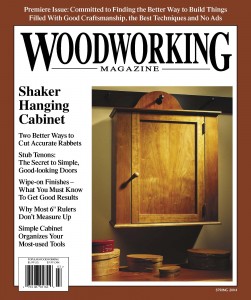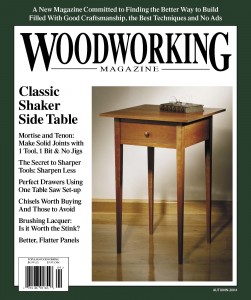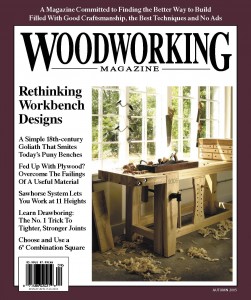We may receive a commission when you use our affiliate links. However, this does not impact our recommendations.
Every other day or so, I get an e-mail about the quotations we ran in Woodworking Magazine and “used” to run in Popular Woodworking Magazine, from folks wondering why we no longer include them. But we do! You’ll find them in most of the feature articles, in a colored box tucked into the text (though I’ll concede that the text is smaller than it once was, and perhaps a little bit harder to spot, simply because we don’t want to take too much space away from the article).
But those e-mails got me to thinkin’ that those of you who appreciate those quips, aphorisms and precepts might enjoy a retrospective of the quotations we included in Woodworking Magazine…in serial format (what can I say; I’m a slow typist). So forthwith, here are the quotations from Woodworking Magazine Issues 1 through 4:
 Issue 1, Spring 2004:
Issue 1, Spring 2004:
• “By All means read what the experts have to say. Just don’t let it get in the way of your woodworking.” John Brown (1932–2008), Welsh stick chairmaker
• “Each plank…can have only one ideal use. The woodworker must find this ideal use and create an object of utility to man, and if nature smiles, an object of lasting beauty.” George Nakashima (1905-1990), woodworker, author of “The Soul of a Tree”
• “The Expectations of life depend upon diligence; the mechanic that would perfect his work just first sharpen his tools.” Confucius (551 B.C.-479 B.C.), philosopher
• “A determined soul will do more with a rusty monkey wrench than a loafer will accomplish with all the tools in a machine shop.” Robert Hughes (1938-2012), Australian art critic
• “One only need two tools in life: WD-40 to make things go, and duct tape to make them stop.” unknown; attributed to G. Weilacher
• “When I’m working on a problem, I never think about beauty. I think only how to solve the problem. But when I have finished, if the solution is not beautiful, I know it is wrong.” R. Buckminster Fuller (1895-1983), inventor, architect and designer
• “Skill without imagination is craftsmanship and gives us many useful objects such as wickerwork picnic baskets. Imagination without skill gives us modern art.” Tom Stoppard (1937-) “Artist Descending a Staircase”
• “The pioneers cleared the forests from Jamestown to the Mississippi with fewer tools than are stored in the modern garage.” unknown; attributed to Dwayne Laws
• “When the only tool you have is a hammer, you tend to see every problem as a nail.” Abraham Maslow (1908-1970), psychologist, philosopher
• “One machine can do the work of 50 ordinary men. No machine can do the work of one extraordinary man.” Elbert Hubbard (1856-1915), author and teacher
 Issue 2, Autumn 2004
Issue 2, Autumn 2004
• “You will find something more in woods than in books. Trees and stones will teach you that which you can never learn from masters.” Saint Bernard (1090-1153), French abbot
• “It’s good to have an end to journey toward; but it is the journey that matters, in the end.” Ursula K. LeGuin (1929-), novelist, poet, essayist
• “Only those who have the patience to do simple things perfectly ever acquire the skill to do difficult things easily.” Friedrich von Schiller (1759-1805), dramatist, essayist and poet
• “Any intelligent fool can make things bigger, more complex, and more violent. It takes a touch of genius – and a lot of courage – to move in the opposite direction.” E.F. Schumacher (1911-1977), author of “Small is Beautiful”
• “The carpenter is not the best who makes more chips than all the rest.” Arthur Guiterman (1871-1943), humorist, poet and journalist
• “The finest tool ever created is the human hand, but it is weak and it is fallible.” Sign above door to shop of planemaker and author Cecil Pierce (1906-1996)
• “Yes, risk-taking is inherently failure-prone. Otherwise it would be called sure-thing-taking.” Tim McMahan (1949-), international business speaker, author and photographer
• “Show us a man who never makes a mistake and we will show a man who never makes anything. The capacity for occasional blundering is inseparable from the capacity to bring things to pass.” Herman Lincoln Wayland (1830-1898), author
• “Believe one who has tried it.” Virgil (70 B.C.-19 B.C.), Roman author and poet
 Issue 3, Spring 2005
Issue 3, Spring 2005
• “‘Better’ is the enemy of ‘Good.'” Michael Dunbar, chairmaker and author
• “All things good to know are hard to learn.” Greek proverb
• “He who works with his hands is a laborer. He who works with his hands and his head is a craftsman. He who works with his hands and his head and his heart is an artist.” St. Francis of Assissi (1181-1226), patron saint of animals and the environment, founded the Franciscan Order
• “Everything should be made as simple as possible, not simpler.” Albert Einstein (1879-1955), scientist, mathematician, inventor
• “Whether made into a wooden pillow or table, wood with excellent grain is a guarantee of splendid poems, and the composition of perfect documents.” Liu Sheng from “Ode to a Fine Grained Wood,” a Chinese text from the second century, B.C.
• “Because people are dead, it does not follow that they were stupid.” – David Pye, author, “The Nature and Art of Workmanship.”
• “Handle your tools without mittens.” Benjamin Franklin (1706-1790), “Poor Richard’s Almanac”
• “Give me six hours to chop down a tree and I will spend the first four sharpening the ax.” Abraham Lincoln (1809-1865), U.S. President
• “It is the first of all problems for a man to find out what kind of work he is to do in this universe.” Thomas Carlyle (1795-1881), “Address at Edinburgh”
 Issue 4, Autumn 2005 (In this issue, BTW, is to the best of my knowledge the first public declaration of Christopher’s enduring love for the Roubo bench)
Issue 4, Autumn 2005 (In this issue, BTW, is to the best of my knowledge the first public declaration of Christopher’s enduring love for the Roubo bench)
• “Well, my standard formula was the better work you do, the more chance that you’ll starve.” James Krenov in a 2005 interview conducted by Oscar Fitzgerald
• “The two most powerful warriors are patience and time.” Leo Tolstoy (1828-1910), Russian novelist and philosopher
• “Think about it: Everything with a power cord eventually winds up in the trash.” John Sarge, timber framer and blacksmith instructor at Tillers International school, on the lasting value of hand tools
• “Hand-craft signifies cunning, or sleight, or Craft of the Hand, which cannot be taught by Words, but is only gained by Practice and Exercise….” Joseph Moxon in the preface to “Mechanick Exercises or the Doctrine of Handy Works”
• “A simple bench is like Tuscan pasta soup. You think it will be better if you add more stuff. But getting the basics right is way more important, and the extras won’t make up for a poorly prepared stock.” Adam Cherubini, woodworker at Pennsbury Manor (and a PWM columnist)
• “Anyone who doesn’t think money grown on trees hasn’t bought any lumber lately.” unknown
• “Ease and speed in doing a thing do not give the work lasting solidity of exactness of beauty.” Plutarch (circa 46-120), from “Life of Pericles”
Stay tuned for more!
p.s. If you’re interested in buying a digital download of each issue, simply click on the title next to each cover to get to our store.
Here are some supplies and tools we find essential in our everyday work around the shop. We may receive a commission from sales referred by our links; however, we have carefully selected these products for their usefulness and quality.








Bless you. So many times I find that reading others thoughts tend to lend a greater perspective to mine.
Thanks for reprinting these. I will need to keep an eye for these in the magazine.
I think I need to hang the Friedrich von Schiller quote over my workbench.
There are some great ones in there Meghan.
Nice, but spell check is not edit check…DAMHIKIT
Each plank…can have only onE ideal use…
the mechanic that would perfect his work Must first sharpen his tools.”
“The carpenter is not he (nest)(???) who makes more chips
“Because people are dead, it does not follow that theY(re) were stupid.
Anyone who doesn’t think money growS on trees hasn’t bought any lumber lately
“Far better is it to dare mighty things, to win glorious triumphs, even though checkered by failure… than to rank with those poor spirits who neither enjoy nor suffer much, because they live in a gray twilight that knows not victory nor defeat. ”
Theodore Roosevelt
“You have dared a mighty thing and I have just been a cheeky critic.”
Keep daring,
Jay Sprague, Oct. 7, 2012